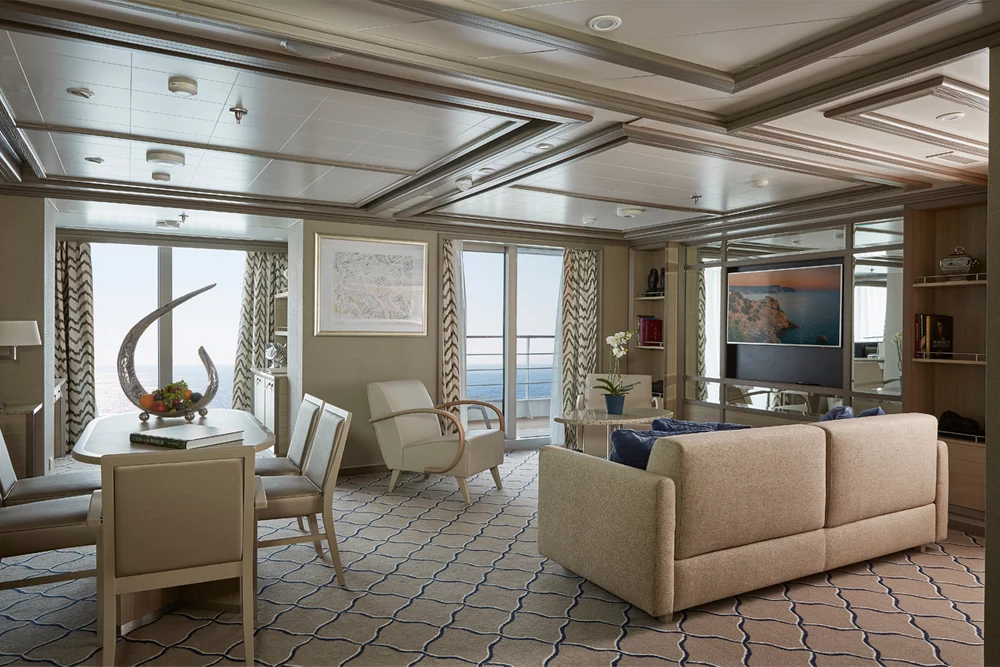Seward to Vancouver
- 23 Jul ‘26
- 7 nights
- Departing from Seward (Anchorage
- Silver Moon
-
Inside price fromCall for price
-
Outside price fromCall for price
-
Balcony price fromCall for price
-
Suite price from$12,400*/pp
YOUR ITINERARY
Seward (Anchorage, Alaska) United States - Hubbard Glacier, U.S.A - Juneau, Alaska - Skagway, Alaska - Sitka, Alaska, United States - Ketchikan, Alaska - Pine Island, Canada - Seymour Narrows, Canada - Vancouver, Canada
Monumental scenery surrounds you in this remote corner...
Monumental scenery surrounds you in this remote corner of the world, where glaciers calve and whales cruise through inky waters, before an immense mountain backdrop. Almost totally submerged by the colossal landscapes around it, Seward – and the wonders of Kenai Fjords National Park – offer some of astonishing Alaska’s most thrilling scenery. Located in a deep gash in the Kenai Peninsula, Seward is a place to immerse yourself in nature’s majesty. View less
Fjords carve into the landscape, while the Harding Icefield – which caps Kenai Fjords National Park – reaches out its icy fingers, with glaciers spilling down between mountain peaks. Head to Holgate Glacier, to come face to face with a breathtaking stack of intense blue and white ice. Get up close in a kayak or boat ride, to slalom through the discarded confetti of ice chunks, and perhaps even witness the powerful spectacle of an ice ledge creaking and groaning, before plunging to the waters below. The city of Anchorage is easily within reach from here, offering an incongruous contrast to the wild wonders of Alaska. A place where deep-sea fishermen bump shoulders with businesspeople on the 9-5, it’s a fascinating, remote city. Home to almost half of the Alaskan population, Anchorage and its humble skyline is dwarfed by the snowy peaks of the wilderness beyond. Don’t miss the opportunity to immerse yourself in the unique culture, traditions and heritage of the First Nation people of these lands too.
Hubbard Glacier, off the coast of Yakutat, Alaska, is the larg...
Hubbard Glacier, off the coast of Yakutat, Alaska, is the largest glacier in North America, with a calving front that is more than six miles wide. One of the main sources for Hubbard Glacier originates 76 mi inland. It has been a very active glacier, experiencing two major surges in the past 30 years. This glacier was named after Gardiner Greene Hubbard, a U.S. lawyer, financier, and philanthropist. He was the first president of the National Geographic Society.
Extraordinary adventures amid nature’s wildest stag...
Extraordinary adventures amid nature’s wildest staging await at Juneau. The majestic Mendenhall Glacier sprawls down from Juneau Icefield, which provides an icy cap to the area’s rip-roaring scenery. State capitals simply don’t get more dramatic than this isolated, remote city lost amid the Alaskan wilds. Even the roads eventually peter out, absorbed by forests and viewpoints, firmly underlining the isolated location, hidden behind an impenetrable wall of rigid mountains. Rise up to Mount Roberts Tramway’s viewpoint, to see the city swallowed by this most colossal backdrop. View less
This is glacier country, and no fewer than 38 ice flows branch off from the main Juneau Icefield, slowly carving out valleys in their wakes. Taku Glacier cuts deep into the mountain, forming a colossal sculpture that is one of the world’s thickest – almost a mile deep. Mendenhall Glacier cascades down, just 12 miles away from downtown, terminating in its own lake and visitor centre. With 1,500 square miles of ice field to explore, one of the best ways to take in the magnitude and majesty of this epic ice sculpture is to hold on tight on as the propeller whirs, and you soar into the skies on an exhilarating sightseeing flight. Cruising up above the icy world that fills in these serrated mountain peaks is a once in a lifetime experience. The animals that inhabit the Southeast Alaskan wilds are just as inspiring as the landscapes – families of bears patrol the riverbanks, bald eagles survey the surroundings watchfully, and Pacific humpbacks migrate from Hawaii’s waters to feast on the krill rich, icy waters. Fish for huge catches, power across the ice in a snow-sledge, or kayak just below glaciers. However you choose to immerse yourself in it, Juneau’s incredible outdoor adventures never disappoint.
“North to Alaska” was the song sang by ...
“North to Alaska” was the song sang by those rushing to the goldmines of the Klondike. Usually they meant Skagway. The White Pass and Chilkoot Trails were the gateways to the Yukon Territory.
The gold rush was a boon and by 1898 Skagway was Alaska’s largest town with a population of approximately 20,000. Hotels, saloons, dance halls and gambling prospered, attracting Skagway residents as well as the 10,000 people living in the nearby tent city of Dyea. But, as the gold dwindled in 1900, so did the population as miners quickly moved to Nome.
Today with a population of less than 1,000, the town retains the flavor of the gold-rush era in its downtown, a historic district.
Sitka began as a major Tlingit Indian village and was called...
Sitka began as a major Tlingit Indian village and was called “Shee Atika,” which translates roughly as “settlement on the outside of Shee.” “Shee” is the Tlingit name of Baranof Island.
In 1799, Alexander Baranof, the general manager of the Russian American Company, decided to move his base of operations from Kodiak and set up camp at what is now called Old Sitka, 7.5 miles north of the present-day town. He called the settlement St. Archangel Michael. The Tlingit Indians of the area resisted the occupation and, in 1802, with Baranof away, burned the fort and massacred the Russian settlers. Two years later, Baranof returned and besieged the Indian fort. The Tlingits withdrew and the area was once again in Russian hands. This time, the Russians built the new city on a different site and called it New Archangel.
For over six decades, New Archangel was the capital of the Russian empire in Alaska. By 1867, the Alaska colony had become too much of a financial burden to Russia. William Seward, U.S. Secretary of State, negotiated with the Russian Czar to purchase the Territory of Alaska for $7.2 million. The American press scoffed at Seward and the U.S. government for purchasing what they called “Seward’s Folly,” “Seward’s Icebox,” and “Walrussia.”
On October 18, 1867, the Russian flag was lowered at New Archangel and the Stars and Stripes were raised over newly renamed Sitka. The name comes from the Tlingit word “Sheetkah,” which means “in this place.” All Russian citizens living in the former colony were given the opportunity to become American citizens. Many went home, although a few stayed or migrated to California.
Sitka remained the capital of the Territory of Alaska from 1867 to 1906, when it was moved to Juneau. The move was a direct result of the gold rush. In plain terms, Sitka did not have any and Juneau did.
After the Japanese attack on Pearl Harbor, Sitka became a full-scale naval base. At one time during the war, Sitka had a total population of 37,000. With the end of World War II, however, the city settled into a quieter existence. The biggest boom in modern days for Sitka came in 1959 when the Alaska Lumber and Pulp Company built a pulp mill at Silver Bay, near the city.
Today, picturesque Sitka is known for its fishing and of course its many historic attractions.
The Salmon Capital of the World is a thrilling introdu...
The Salmon Capital of the World is a thrilling introduction to wild and wonderful Alaska, sitting at the southern gateway to the Inside Passage’s famed route of larger than life scenery. Cruise through the waters, or soar just above in a sightseeing plane, to take in the full majesty of the magnificent Misty Fjords National Monument. Home to grizzly and black bears – as well as cruising whales and swimming seals – the wildlife spotting opportunities in this majestic corner of the world are nothing short of spectacular. View less
Towered over by steep banks and valley walls, Ketchikan’s ocean inlet is peppered with granite stacks, looming from the waters. Surrounded by glorious landscapes, head to the Alaska Rainforest Sanctuary, which is alive with bald eagles, black bears and remarkable, thick, yellow banana slugs – the squeamish are advised to keep well clear. Visit Ketchikan’s Heritage Centre, where a collection of intricately carved totem poles rise up, preserving the heritage of the indigenous Tlingit and Haida people of these lands. Ketchikan has the world’s largest collection, and some of the oldest and most precious totems in existence. This frontier city hasn’t always been so wholesome, however. See the colourful historic street that is built on crooked stilts over Ketchikan Creek, which has a crude history as the main red-light district in the city. The brothels closed in the 1950s, but you can explore this legendarily seedy past at Dolly’s House – a brothel turned museum. See the Married Man trail, a historical route used to enter Creek Street away from prying eyes.
Pine Island is an island of Northern Ontario, Cana...
Pine Island is an island of Northern Ontario, Canada, in the northwestern portion of Lake Huron, near the mouth of the St. Marys River, which connects Lake
YOUR SHIP - The Silver Moon
The new Dawn is coming! Be the first to sail aboard Silver Dawn, the tenth ultra-luxury ship to join our fleet.
Building on the phenomenal success of Silver Muse, Silver Moon – to be delivered August 2020 – will mirror her sister ship and will establish a new era of Silversea. At 40,700 gross tons and with a capacity to accommodate 596 passengers on board, Silver Moon will maintain the small-ship intimacy and spacious all-suite accommodation which are the hallmarks of the Silversea experience. Silver Moon will also feature the all-new Sea And Land Taste (.S.A.L.T.) programme – an immersive culinary concept that will enable guests to travel deeper through a range of destination based gastronomic experiences. Get ready – a new moon is coming.
Description
The new Dawn is coming! Be the first to sail aboard Silver Dawn, the tenth ultra-luxury ship to join our fleet.
Building on the phenomenal success of Silver Muse, Silver Moon – to be delivered August 2020 – will mirror her sister ship and will establish a new era of Silversea. At 40,700 gross tons and with a capacity to accommodate 596 passengers on board, Silver Moon will maintain the small-ship intimacy and spacious all-suite accommodation which are the hallmarks of the Silversea experience. Silver Moon will also feature the all-new Sea And Land Taste (.S.A.L.T.) programme – an immersive culinary concept that will enable guests to travel deeper through a range of destination based gastronomic experiences. Get ready – a new moon is coming.
STATEROOMS

suite
SIMILAR CRUISES
-
DateTripCruise ShipNightsPrice
-
2026-05-14Seward to VancouverSilver Moon- 7Nights7
-
2026-05-28Seward to VancouverSilver Moon- 7Nights7
-
2026-06-11Seward to VancouverSilver Moon- 7Nights7
-
2026-06-25Seward to VancouverSilver Moon- 7Nights7
-
2026-07-09Seward to VancouverSilver Moon- 7Nights7
*Based on Twinshare cabin

